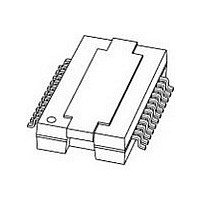TDF8590TH/N1-T NXP Semiconductors, TDF8590TH/N1-T Datasheet - Page 4

TDF8590TH/N1-T
Manufacturer Part Number
TDF8590TH/N1-T
Description
Audio Amplifiers AMPLIFIER CLASS D
Manufacturer
NXP Semiconductors
Datasheet
1.TDF8590THN1-T.pdf
(30 pages)
Specifications of TDF8590TH/N1-T
Product
Class-D
Output Power
160 W
Available Set Gain
32 dB
Common Mode Rejection Ratio (min)
75 dB
Thd Plus Noise
0.15 %
Maximum Operating Temperature
+ 85 C
Mounting Style
SMD/SMT
Audio Load Resistance
8 Ohms
Dual Supply Voltage
+/- 27 V
Input Signal Type
Differential
Minimum Operating Temperature
- 40 C
Output Signal Type
Differential, Single
Supply Type
Dual
Output Type
1-Channel Mono or 2-Channel Stereo
Package / Case
HSOP-26
Operational Class
Class-D
Audio Amplifier Output Configuration
1-Channel Mono/2-Channel Stereo
Output Power (typ)
160x1@8Ohm/80x2@4OhmW
Audio Amplifier Function
Speaker
Total Harmonic Distortion
0.15@8Ohm@1W%
Single Supply Voltage (typ)
Not RequiredV
Dual Supply Voltage (typ)
±27V
Power Supply Requirement
Dual
Rail/rail I/o Type
No
Single Supply Voltage (min)
Not RequiredV
Single Supply Voltage (max)
Not RequiredV
Dual Supply Voltage (min)
±14V
Dual Supply Voltage (max)
±29V
Operating Temp Range
-40C to 85C
Operating Temperature Classification
Industrial
Mounting
Surface Mount
Pin Count
24
Package Type
HSOP
Lead Free Status / RoHS Status
Lead free / RoHS Compliant
Other names
TDF8590TH/N1,118
NXP Semiconductors
TDF8590TH_2
Product data sheet
6.2 Mode selection
The TDF8590TH contains two independent amplifier channels with a differential input
stage, high output power, high efficiency (90 %), low distortion and a low quiescent
current. The amplifier channels can be connected in the following configurations:
The TDF8590TH also contains circuits common to both channels such as the oscillator, all
reference sources, the mode functionality and a digital timing manager. For protection a
thermal foldback, temperature, current and voltage protection are built in.
The TDF8590TH can be switched in three operating modes via pin MODE:
The input stage (see
output. To avoid pop noise the DC output offset voltage should be increased gradually at a
mode transition from mute to operating, or vice versa, by limiting the dV
MODE, resulting in a small dV
constant for a gradually increase of the DC output offset voltage between mute and
operating is generated via an RC network on pin MODE. An example of a switching circuit
for driving pin MODE is illustrated in
Table 3.
S1
closed
closed
open
open
Fig 3. Example of mode selection circuit
•
•
•
•
•
Mono Bridge-Tied Load (BTL) amplifier
Dual Single-Ended (SE) amplifiers
Standby mode; the amplifiers are switched off to achieve a very low supply current
Mute mode; the amplifiers are switching idle (50 % duty cycle), but the audio signal at
the output is suppressed by disabling the VI-converter input stages
Operating mode; the amplifiers are fully operational with output signal
Mode selection
Figure
Rev. 02 — 23 April 2007
2
1) contributes to the DC offset measured at the amplifier
V
O(offset)
DDP
S2
closed
open
closed
open
80 W SE (4 ) or 1
5.6 k
5.6 V
/dt for the DC output offset voltage. The required time
Figure 3
S1
5.6 k
and explained in
5.6 k
S2
160 W BTL (8 ) class-D amplifier
001aad836
100 F
(10 V)
MODE
SGND
Mode selection
Standby mode
Standby mode
Mute mode
Operating mode
Table
TDF8590TH
3.
© NXP B.V. 2007. All rights reserved.
MODE
/dt on pin
4 of 30
















